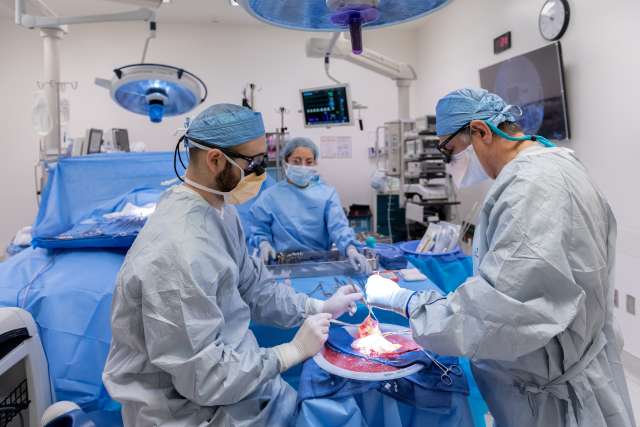The life-saving kidney transplant Ray Jones received on April 7, 2022, marked the 10,000th such transplant performed at UCLA Health.
“At UCLA, we’ve gone from being a small program doing 20 to 25 transplants a year in the 1980s to one of the biggest programs in the country,” said Gabriel Danovitch, MD, medical director of the UCLA Health Kidney Transplant Program.
UCLA Health has long been a leader in kidney transplantation, dating back to the 1960s. As of Aug. 14, 2023, the program has transplanted 10,215 kidneys. It now performs about 400 kidney transplants each year, Dr. Danovitch said.
During Dr. Danovitch’s tenure at UCLA Health, both the transplant field and UCLA’s kidney transplant center have seen significant advances.
Not long after Dr. Danovitch became the medical director of UCLA’s program in 1982, cyclosporine, a drug that largely prevents organ rejection, became widely available. This dramatically improved outcomes, setting the stage for an increase in successful transplants and paving the way for other organ transplantations as well, he said.
Much more recently, UCLA Health has led the development of a transplant tolerance protocol that takes stem cells from the kidney donor and transfers them to the recipient, to help the recipient’s body recognize, rather than reject, the transplanted organ. This allows recipients to gradually get off the immunosuppression drugs. The protocol is currently only used in specific situations, Dr. Danovitch said, but the hope is that it will eventually be available more broadly.
Recovery times have also been greatly reduced, with all nephrectomies (removing a kidney from a donor) now done laparoscopically. The switch to the minimally invasive method has reduced the required hospital stay from a few days to just overnight. This has helped boost living kidney donations, said Hans Albin Gritsch, MD, surgical director of the UCLA Health Kidney Transplant Program, because the surgery is less complicated and requires less down time.
Making more kidneys available
UCLA Health has taken other steps as well to increase the number of kidneys available for transplant.
“Over the years, we’ve been gradually increasing the complexity of the kidneys we accept from deceased donors and from living donors,” Dr. Gritsch explained.
UCLA Health was the first program in Los Angeles to do kidney transplants for patients with HIV, he said. Doing so required a team approach, given the additional complications related to the immune suppressing drugs transplant recipients need to take, which prevent organ rejection but also leave them more vulnerable to infection.
Dr. Gritsch also highlighted UCLA Health’s active participation in the living donor exchange program, which matches screened donors with compatible patients and allows far more living donor transplants to be performed.
“Because of the exchange program, it’s no longer necessary for donors be a match based on blood or tissue type,” he said. The donors, however, “need to be in tip-top health and motivated to move ahead with the donation.”
Although many people are reluctant to accept help from other people, the risks of kidney donation “are very low in carefully selected individuals,” he added. “As long as a person does not have a condition that would put them at risk for complications with surgery or increase the risk of serious disease later in life, they can usually be a kidney donor.”
As an “all-in” center, the UCLA Health program is a strong proponent of the living donor exchange program, which “allows many more people to get a healthy living donor kidney,” Dr Gritsch explained. “And the alternative is a long waiting time for a deceased donor.”
Participating in a kidney donation chain can also help address the downtime issues associated with both donating and receiving a kidney.
Dr. Danovitch shared an example: “Let’s say you have a couple, and they don’t want to do the procedure at the same time because they need to care for each other.” In this scenario, “the donation can take place in advance, so that the recipient then takes care of the donor. The donor gets better from the surgery and then looks after the recipient, who receives a kidney from someone else.”
Education and consultation
UCLA Health places a great deal of emphasis on educating patients, their caregivers and potential kidney donors ahead of time, so they can ready themselves for what to expect and help ensure a successful outcome. That includes anti-rejection medications, Dr. Danovitch noted, as well as regular follow-up appointments and a general commitment to their health, including keeping active.
“We see the patient in a holistic fashion,” he said.
Kidney transplants are performed at Ronald Reagan UCLA Medical Center, with pre- and post-transplant outpatient visits at the Connie Frank Clinic at 200 UCLA Medical Plaza.
In addition to being the largest transplant center in Southern California, UCLA Health is known for its pediatric kidney transplant program. Although the number of children requiring kidney transplants is a small portion of the overall number of recipients, there can be additional complicating factors, Dr. Gritsch said. Some pediatric patients may have underlying congenital urologic issues, including abnormal bladder function, that require additional urinary reconstruction.
“We work very closely with the pediatric urologists in preparing these children,” he said, “and we also have a separate team of pediatric nephrologists.”
Also, because UCLA Health is a combined adult/pediatric system, parents who are donating a kidney can be in the same hospital as their child, he noted.
Lisa L. Lewis is the author of this article.




